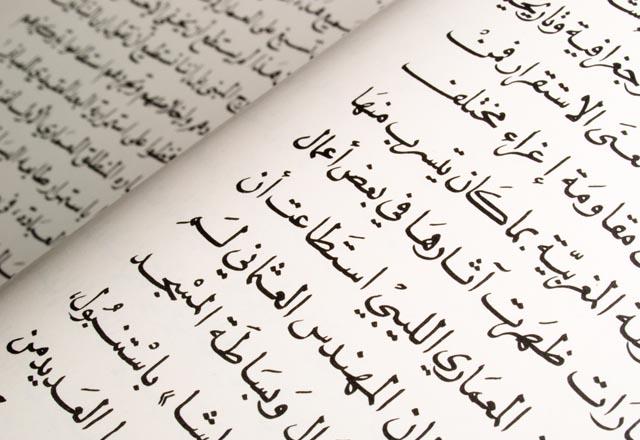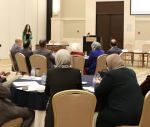You are here
‘Law requires educators, media professionals to pass Arabic proficiency test’
By JT - Sep 01,2015 - Last updated at Sep 01,2015

A calligrapher works on a banner in downtown Amman recently (Photo by Amjad Ghsoun)
AMMAN — Educators and media professionals are required to pass an Arabic proficiency exam similar to the TOEFL in order to qualify for jobs in their respective sectors under a law that went into effect on Tuesday.
Under Article 10 of the law to protect Arabic the proficiency exam will be offered at accredited centres that issue the certificates required to be submitted when applying to positions in media — such as broadcasters, producers and editors — or education and higher education, the Jordan News Agency, Petra, reported.
Non-Arab teachers and educators who teach a foreign language are not required to take the exam, nor are those who work at media outlets’ foreign language departments, under the law, published in the Official Gazette 60 days ago, according to Jordan Academy of Arabic President Khalid Karaki.
Karaki said the new law was issued simultaneously with the Jordan Academy for Arabic Law for 2015, according to Petra.
The former minister and Royal Court chief said launching the law came to counter the growing use of colloquial Arabic in the media, and even in lectures and seminars.
Language and grammatical errors also abound in a number of places, streets, public facilities and shop names, he said.
Streets are full of “linguistic contamination” and texts that do not adhere to language rules, Karaki added.
The law, he said, is reform oriented and is “one of the greatest gifts offered to the community” because it is part of the overall comprehensive reform project, Petra reported.
Under the law, a committee will be formed to review the names of streets, neighbourhoods and public yards, as well as commercial, financial, industrial, science, social, service, entertainment, and tourism institutions.
Moreover, ministries; official, public, and private institutions; municipalities; syndicates; organisations; clubs, political parties; civil society institutions; and companies, are all obligated to use modern standard Arabic in their documents, transactions, records and clearances.
Karaki, a former deputy prime minister, noted that standard Arabic should be used in public advertisements and movie subtitles, and on banknotes and coins. It should also be the main language of scientific research.
Scientific research could be published in foreign languages provided that an Arabic translation is provided, he said, and teachers in schools and higher education institutes will be obligated to use proper Arabic in class, according to Petra.
Related Articles
AMMAN — The Council of Ministers on Sunday approved the 2016 draft by-law requiring teachers, broadcasters and editors to take an Arabic pro
AMMAN — The Education Ministry is scheduled to hold an Arabic proficiency exam, to be taken by 390 teachers and engineers on Wednesday for e
Violators of a law drafted to protect Arabic as the official state language will be fined JD1,000-3,000, the government has decided.

















